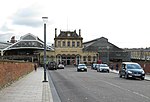Park Hotel, Preston

The Park Hotel was a railway-owned hotel at East Cliff, Preston, Lancashire, England, used for many years as offices, but now being restored as a hotel. The hotel opened in 1883 and was operated jointly by the Lancashire and Yorkshire Railway and London and North Western Railway. In the 1923 grouping of railway companies, ownership passed to the London, Midland and Scottish Railway. When the UK's railways were nationalised in 1948, it passed to the British Transport Commission's Hotels Executive, and thence to British Transport Hotels, who sold it in 1950. It has subsequently been, and as of September 2014 remains, used as offices, and renamed "East Cliff County Offices", by Lancashire County Council, who also had a modern annexe, adjacent. Located on a small hill, the red-brick building overlooks Preston railway station, on the West Coast Main Line, to its north-west and Miller Park and the River Ribble to its south-east. In its heyday, the hotel was connected to the southern end of the main south-bound platform (the modern-day platform 4) at Preston station by a covered footbridgeVarious pre-1923 objects from the hotel are in the National Railway Museum at York. These include Mappin & Webb cutlery and Elkington & Co. tableware and candlesticks, the latter marked with the initials "P.P." and a lamb and flag, the coat of arms of the city.The historic hotel structure was used for many decades as an office building for the Lancashire County Council, along with an adjoining tower, constructed in the 1960s. In 2020, the modern office tower was demolished as part of a plan by the Council to restore the hotel to operation.
Excerpt from the Wikipedia article Park Hotel, Preston (License: CC BY-SA 3.0, Authors, Images).Park Hotel, Preston
East Cliff, Preston Avenham
Geographical coordinates (GPS) Address Nearby Places Show on map
Geographical coordinates (GPS)
| Latitude | Longitude |
|---|---|
| N 53.7527 ° | E -2.7054 ° |
Address
East Cliff
East Cliff
PR1 3JT Preston, Avenham
England, United Kingdom
Open on Google Maps








